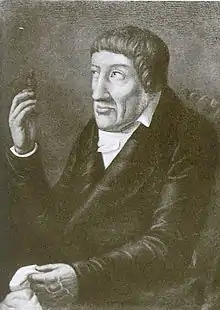Grigory Razumovsky
Count Grigory Kirillovich Razumovsky (Russian: Григорий Кириллович Разумовский; Ukrainian: Григорій Кирилович Розумовський; November 10, 1759 – June 3, 1837) was a Russian nobleman, political philosopher, botanist, zoologist and geologist. He was a member of the Razumovsky noble family.
Grigory Razumovsky | |
|---|---|
| Григорий Разумовский Григорій Розумовський | |
 | |
| Born | November 10, 1759 |
| Died | June 3, 1837 (aged 77) |
| Citizenship | Austrian Empire |
| Title | Graf |
| Spouse(s) | Henrietta Malsen, Teresa Elizabeth Schenk de Castell |
| Parent |
|
Career
Razumovsky is known from his writings in the West as Gregor or Grégoire, who lost his Russian citizenship for openly criticizing the czarist system under emperor Alexander I, which he saw as pandering to the desires of a corrupt oligarchy of nobles. Gregor emigrated to western Europe, where was subsequently incorporated into the Bohemian nobility (Inkolat im Herrenstande) in 1811 and accorded the rank of count of the Austrian Empire. As a natural scientist, Gregor was the first to describe and classify Lissotrion helveticus. He was the fifth son of the last hetman of Ukraine, Kirill Grigorievich Razumovsky and brother of prince Andreas Razumovsky, he is also the ancestor of all living members of the family as such, the Russian lines having gone extinct.
In the field of geology, Razumovsky has been described as a "non-actualistic catastrophist". He was also an advocate of Neptunism.[1]
In 1788, he was elected a foreign member of the Royal Swedish Academy of Sciences.
Publications
- Observations Minéralogiques sur les environs de Vienne (1822).
- «Essai d’un système de transition de la nature dans le règne minéral. Lausanne»
- «Oeuvres de M. le comte Grégoire de Razoumowsky». Lausanne, chez Maures Cadet. 1784. 2 vol.
- "Histoire naturelle de Jorat et de ses environs et celle des trois lacs de Neufchatel, Morat et Brienne, précédée d’un essai sur le climat, les productions, le commerce, les animaux de la partie du pays de Vaud ou de la Suisse Romanne, qui entre dans le plan de cet ouvrage, par le comte de Razoumowsky (Lausanne, chez Jean Maures. 1789. 2 vol).[2]
- Von der Ukrainischen Stutereien. Lernbegriff von den Krankheiten der Pferde und deren Heilung von I. C. Zeihers. Berlin. 8
Memberships
- Royal Swedish Academy of Sciences
- Royal Academy of Turin[3]
- Bavarian Academy of Sciences and Humanities
- Russian Mineralogical Society
- Jena Mineralogical Society
- Imperial Moscow Society of Naturalists
- Zurich Physical Society
- Basel Medical Physics Society
- Turin Agronomic Society
References
- Hooykaas, R. (1970). Catastrophism in Geology, its scientific character in relation to actualism and uniformitarianism. Koninklijke Nederlandse Akademie van Loefenschappen, afd. Letterkunde, Med. (n.r.), 33 (7): 271-316.
- Razoumowsky, Gregoire (1789). "Histoire naturelle du Jorat et de ses environs; et celle des troi lacs de neufchatel, Morat et Bienne" (PDF). Tome premier. xvi (322): 221–301 – via AntWiki.
- "Accademia delle Scienze". www.accademiadellescienze.it. Retrieved 2023-09-09.